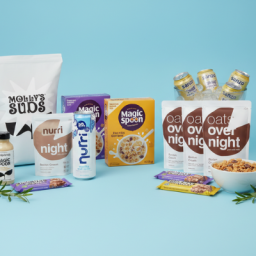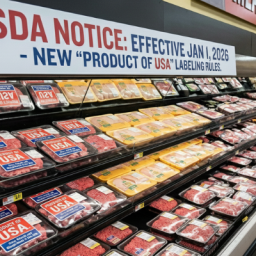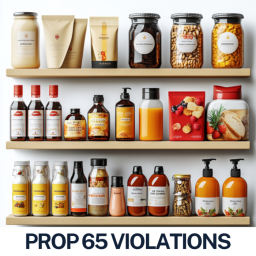
Why Congress Is Targeting Hemp-Derived THC Products in the 2025 Spending Bill
In early November 2025, lawmakers inserted new hemp-restriction language into the federal spending package designed to reopen the U.S. government. This move, tucked into the Fiscal Year 2026 Agriculture Appropriations bill, could effectively ban many hemp-derived cannabinoid products, including items sold in food, beverage, and personal-care markets.
The proposal would redefine “hemp” under federal law to include total THC (not just delta-9 THC) and exclude products intended for human or animal consumption that contain any intoxicating cannabinoids.
That means common formulations, like delta-8 THC beverages, THCA edibles, or even some full-spectrum CBD items, could soon fall outside the legal definition of hemp.
According to the Congressional Research Service and reports from Cannabis Business Times and MJBizDaily, the language is still under negotiation but already reshaping compliance planning across the consumer-goods sector.
(Source: CRS Report IN12565)
Goodbye Farm Bill Loophole? Understanding the Redefined Hemp Standard
Under the 2018 Farm Bill, hemp was defined as Cannabis sativa L. and its derivatives containing no more than 0.3% delta-9 THC. This opened the door for a nationwide hemp-derived product market.
The new proposal, however, would measure “total THC”—combining delta-9 THC and THCA (its acidic precursor)—and exclude any “hemp-derived cannabinoid product” intended for ingestion, inhalation, or topical use.
In effect, a hemp-infused seltzer, gummy, or tincture could become federally illegal, even if it contains trace cannabinoids derived from hemp.
It also targets synthetic or semi-synthetic cannabinoids like delta-8, delta-10 and THC-O acetate, which were never explicitly legalized but proliferated under the Farm Bill’s gray areas.
Hemp in Your Ingredients List? Why That’s Suddenly a Legal Risk
The proposed change isn’t limited to dispensaries, it extends deep into the F&B and consumer-packaged-goods industries.
1. Ingredient risk and reformulation challenges
A shift from “delta-9 only” to “total THC” means that even non-intoxicating extracts could exceed legal limits once THCA is counted. Brands using hemp-derived ingredients in beverages, confections, or wellness products may need to reformulate or discontinue entire product lines.
2. Labeling and marketing exposure
If a product no longer qualifies as “hemp,” marketing it as such could invite FDA or FTC scrutiny, trigger class-action claims, or lead to state enforcement. Any “hemp,” “THC,” or “cannabinoid” labeling should be reviewed now.
3. Supply-chain and contract implications
Procurement teams should confirm COA testing covers total THC, not just delta-9. Supply contracts referencing the 2018 Farm Bill standard may need immediate amendment to avoid breach or misrepresentation claims.
4. Distribution and interstate commerce risk
Even if a product remains legal in one state, federal reclassification could block interstate shipments. National brands must assess logistics, warehousing, and transport exposure.

Six Actions to Take Before the Hemp Ban Becomes Law
- Audit your product portfolio – Identify every SKU containing hemp-derived cannabinoids (CBD, THCA, delta-8 THC).
- Secure detailed COAs – Ensure suppliers measure total THC content and specify whether cannabinoids are natural or synthetic.
- Re-evaluate labeling and claims – Remove or adjust hemp-related terminology that may become misleading under new definitions.
- Plan for multiple outcomes – Model (A) full ban, (B) compromise version, (C) state-by-state tightening.
- Monitor congressional developments – Track amendments to the FY2026 Agriculture Appropriations Bill on congress.gov.
- Engage regulatory counsel – Update contracts, indemnities, and withdrawal plans before enforcement begins.
The Fine Print That Could Decide Which Products Survive
Several critical terms remain undefined:
- “Intoxicating cannabinoid” – Lawmakers haven’t agreed on a THC threshold or test method, leaving enforcement unclear.
- Implementation timeline – Some drafts propose a 12-month grace period; others would take effect immediately.
- State vs. federal conflicts – Dozens of states allow hemp consumables, setting up potential pre-emption fights.
- Senate changes – The Senate’s S.Amdt. 3070 removed key ban language; reconciliation will determine the final scope.
This ambiguity makes proactive compliance essential, waiting for final rules could leave brands out of time.
How This Could Redraw the Line Between Hemp and Marijuana Markets
If enacted, the proposal would effectively eliminate the “hemp loophole” that blurred the line between hemp-derived THC and regulated cannabis products. Licensed cannabis operators may welcome the shift as leveling competition, while F&B companies could lose access to fast-growing “functional hemp” categories.
Either way, the move signals that Congress is aligning hemp oversight with traditional cannabis regulation, a major policy turn from 2018.
Where Juris Law Group’s F&B Team Adds Value in This Transition
At Juris Law Group, P.C., our attorneys specialize in navigating cross-sector regulations affecting F&B and CPG brands. We assist clients by:
- Conducting hemp-ingredient compliance audits to flag risk under new definitions;
- Drafting updated supply and indemnification clauses;
- Reviewing labeling and marketing for cannabinoid references;
- Mapping state and federal divergence to preserve market access; and
- Preparing rapid reformulation and recall plans if implementation occurs.
Early compliance strategy is the difference between a costly recall and a smooth transition.
Key Takeaway
Whether or not the proposed hemp ban passes in its current form, regulatory tightening is inevitable.
Brands that audit early, verify ingredient data, and align with evolving THC definitions will minimize disruption and maintain consumer trust.
Juris Law Group stands ready to help your team stay compliant and stay ahead.















